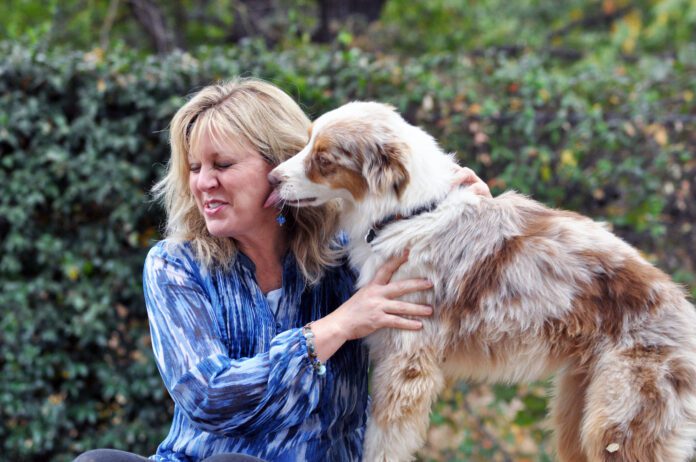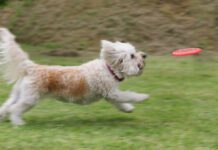Licking is a natural behavior for dogs. The puppies of wild canids (or feral or street dogs) lick their parents’ mouths, which prompt the parents to regurgitate food for them. Mother dogs also instinctively lick their pups to clean them, and pups lick their moms in return. Licking is also a sign of affection which causes a release of oxytocin; it feels good to the dog who licks as well as the dog who gets licked! Dogs also explore the world with tongue – tasting their surroundings.
But what about licking humans? Yes, your dog may be showing her affection for you when she licks you – and she may be getting a little oxytocin boost as well. She might also lick as an appeasement gesture if she thinks you’re upset with her. She could be attention-seeking, or simply washing off good flavors – anything from that peanut butter on your lips to skin lotion you put on this morning.
Is a dog licking you dangerous?
Allowing a dog to lick you, particularly in the face, has the potential to expose you to pathogenic, food-borne bacteria such as Salmonella, Campylobacter, and Pasteurella, as well as Leptospira, the bacteria that causes leptospirosis and is found in the urine or body fluids of infected animals. If you’re confident that your dog has not been exposed to pathogenic bacteria, and are non immune-compromised, you may feel fine about taking those risks. Just remember that dogs also eat yucky stuff, including a variety of animal feces, dead things, and random garbage – and they lick their own nether ends, to keep them tidy. When they lick your face they share all that with you! However, you can minimize the risk by avoiding the dog’s tongue contacting with your mouth and nose.
Conversely, if you use any medicated cream or topical oil, allowing your dog to lick your skin could be harmful to your dog. People who use topical forms of hormones or pain medications should check with their veterinarian before allowing their dogs to lick them. It may be worth asking them about sunscreen and other topicals, too.
How to stop my dog from licking me
Fortunately, if you’re not a fan of being licked by your dog, there are a number of gentle methods to discourage this behavior:
- Give your dog something else to do with her mouth. Preoccupy her tongue with a tasty chewie, a food-stuffed toy, or a snuffle mat.
- Teach her to target – and then reward her for touching her nose to targets that are a short distance from your body. (See: https://qa.whole-dog-journal.com/training/on-target-training/)
- Enrichment! A tired dog is a happy owner. Mental and physical exercise is likely to reduce her need to lick.
- Turn away when she licks. If she’s attention-seeking, pre-empt her licking by giving her attention before the tongue appears. Then turn away if it does.
- Change your soap or lotion. Your dog may be attracted to whatever scent you are using; you might find one she likes less.
Finally, if your dog’s licking is excessive, consider whether it could be a symptom of Obsessive Compulsive Disorder (OCD). If that’s the case, you’re best off seeking the assistance of a qualified dog behavior professional to find tactics to discourage your dog’s persistent licking behavior. But if you’re a fan of normal dog licks, go ahead – enjoy those kisses!







We have a rescue dog that does not ever give kisses. Why do you suppose that is?
I have a rescue that is on the obsessive side. I’ve taken it as a sign of stress and submission. It has gradually subsided as she has relaxed and grown accustomed to the household and our routine. She doesn’t lick other dogs, although I suspect eventually she and my parent’s Dolly will start to clean each others ears as I have seen signs of the beginning of mutual grooming. They are BFFs.
But she still licks me quite a bit. She doesn’t do it so much with other people’s faces, perhaps a body part. But to me, if my face is within reach it gets licked. I am using it for training. She is pushed away and unless she is sitting, she doesn’t get to lick me. When she does what I want of her I will bend down and let her lick me. So far it is working as a form of reward.
Your rescue might have been punished for that behavior prior to adoption. Mine was. It’s been over a year now and occasionally, she will give me a kiss and then quickly corrects herself. I do things that show her kisses are welcome and now, slowly, I will get an arm kiss. Be patient, accepting and loving. It will happen eventually, assuming the scars from previous punishment don’t run too deep.
Why do dogs constantly lick the air when awake and how do you stop that?
Glam. But why would your dog “licking the air” be bothersome to you? It sounds like a completely harmless thing for your dog to do!
Because inhaling that air gives her a bloated belly. Then she gets an upset tummy. When I say it is constant it is constant. Tried CBD for dogs it didn’t nothing to help. Tried melatonin for dogs it did nothing. Gave her an allergy shot did it nothing. Whrn resting or sleeping is the only time she doesn’t do it.
This air licking may be a type of seizure, ask your vet and/or your breeder.
I was taught that they also lick you to mark you with their saliva. Maybe by J. Rogerson, but don’t quote me on that. Seemed feasible.